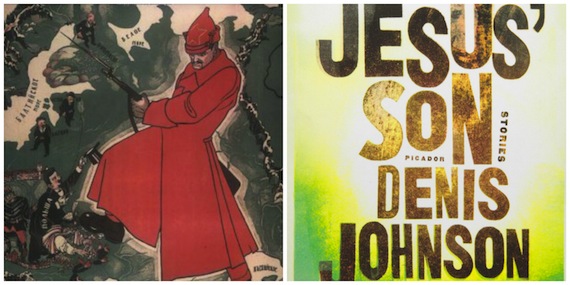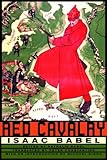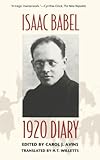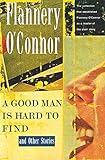
On an August 2013 episode of The New Yorker’s Fiction Podcast, author Donald Antrim read and discussed Denis Johnson’s short story “Work.” Antrim said he remembered the liberation he associated with reading the story when it was published in The New Yorker in 1988: “At the time, I was trying to write stories myself, but they were somewhat dead and I think I felt a little lost…I think reading Denis Johnson had to have something to do with a sense of permission, a sense of freedom to do something that I didn’t understand fully and didn’t know how to imagine or envision.”


 Antrim’s revelatory experience of reading the stories in Denis Johnson’s Jesus’ Son – a linked collection that follows the drug-addled wanderings of a narrator known as “Fuckhead” — is far from unique. In 2012, Illustrator Jane Mount compiled My Ideal Bookshelf, a collection in which 100 contemporary cultural figures shared the books that mattered to them most. Jesus’ Son was tied alongside James Joyce’s Ulysses as the third most selected book. They both only trailed behind Vladimir Nabokov’s Lolita, and Herman Melville’s Moby Dick.
Antrim’s revelatory experience of reading the stories in Denis Johnson’s Jesus’ Son – a linked collection that follows the drug-addled wanderings of a narrator known as “Fuckhead” — is far from unique. In 2012, Illustrator Jane Mount compiled My Ideal Bookshelf, a collection in which 100 contemporary cultural figures shared the books that mattered to them most. Jesus’ Son was tied alongside James Joyce’s Ulysses as the third most selected book. They both only trailed behind Vladimir Nabokov’s Lolita, and Herman Melville’s Moby Dick.
On The New Yorker podcast, Antrim goes on to describe some of the unusual techniques in Jesus’ Son that have rattled so many readers and writers. Antrim notes the clipped and disoriented structure to many of the stories and scenes. He remarks on the speed of the narrative transitions. He says that there’s “an incoherence in the thought process that actually has a coherence.”
Then, as is the case on each episode of the podcast, Antrim reads the selected story: “I’d been staying at the Holiday Inn with my girlfriend, honestly the most beautiful woman I’d ever known, for three days under a phony name, shooting heroin. We made love in the bed, ate steaks at the restaurant, shot up in the john, puked, cried, accused one another, begged of one another, forgave, promised, and carried one another to heaven.” Antrim proceeds through a story in which the narrator and his friend Wayne go to rip copper wire from an abandoned house. Then Wayne visits his wife while Fuckhead waits in the car. Then they go to the bar where they spend all the money they just made scrapping the copper wire. The story ends with Fuckhead gawking at the angelic bartender. “I’ll never forget you,” he thinks. “Your husband will beat you with an extension cord and the bus will pull away leaving you standing there in tears, but you were my mother.”
 New Yorker Fiction Editor Deborah Treisman tells Donald Antrim about how she recently interviewed Denis Johnson at the Brooklyn Academy of Music. She says, “I asked him about this book, about Jesus’ Son…he’s quite dismissive of it when he talks about it now, and he said it’s just a rip-off of Isaac Babel’s Red Cavalry…” Antrim says that he’s never read Red Cavalry, and the discussion of Jesus’ Son, on its own terms, continues on.
New Yorker Fiction Editor Deborah Treisman tells Donald Antrim about how she recently interviewed Denis Johnson at the Brooklyn Academy of Music. She says, “I asked him about this book, about Jesus’ Son…he’s quite dismissive of it when he talks about it now, and he said it’s just a rip-off of Isaac Babel’s Red Cavalry…” Antrim says that he’s never read Red Cavalry, and the discussion of Jesus’ Son, on its own terms, continues on.
But what does Denis Johnson mean by calling his most iconic book a “rip-off” of Red Cavalry — a classic of early 20th-century Russian literature? Johnson’s book features a ragtag cast of addicts in rural America, engaged in efforts of drug procurement and petty crime that almost always go wrong. Red Cavalry, on the other hand, features the title army during the Russian-Polish campaign, the Soviets’ first military effort toward spreading Communism to the rest of Europe. In terms of locations and circumstances, the books are radically different. But, on closer look, they actually do share a lot in common.
“The orange sun is rolling across the sky like a severed head,” Babel writes in the opening story of Red Cavalry (as translated by Peter Constantine). “The stench of yesterday’s blood and slaughtered horses drips into the evening chill.”
In an introduction to Red Cavalry, Michael Dirda writes, “Violence and brutality mingle with a surreal, sometimes poetic beauty…This juxtaposition of an elevated literary style with coarse soldier’s talk, of strikingly original analogy with harsh naturalistic observation, lies at the heart of Babel’s achievement. In every way the stories yoke together opposites.”
Jesus’ Son actually works with a similar set of tools. “The sky is blue and the dead are coming back,” Johnson writes. “Later in the afternoon, with sad resignation, the county fair bares its breast.”
Using “elevated literary style” alongside “harsh naturalistic observation,” both writers convey haunting and brutal landscapes. Babel: “Stars slithered out of the cool gut of the sky, and on the horizon abandoned villages flared up. With my saddle on my shoulders, I walked along a torn-up field path…” Johnson: “There’d been a drought for years, and a bronze fog of dust stood over the plains. The soybean crop was dead again, and the failed, wilted cornstalks were laid out on the ground…”
Both books feature frequent and intense poetic violence. Babel writes of Dolgushov who lies in the mud with his exposed heart beating and his intestines spilling out. “[He] placed his blue palms on the ground and looked at his hands in disbelief.” Johnson writes of McInnes, who’s been shot in the stomach and is dying in the backseat of a car. “[He] was white and sick, holding himself tenderly.”
Both writers seem to be geniuses of metaphors on the sky. Babel: “The moon hung over the yard like a cheap earring.” Johnson: “The sun had no more power than an ornament or a sponge.”
What gets quickly lost when I put particular sections side-by-side like this is how radically different each book still really is. In a Red Cavalry story, a young Jewish soldier will accost an old woman and murder her goose to prove he’s not an intellectual sissy. In a Jesus’ Son story, a drugged-out hospital orderly will try to save a litter of “bunnies” in the desert to prove he’s not a fuck-up. “It’s a name that’s going to stick,” his friend Georgie tells him after he sits on and kills the rabbits. “‘Fuckhead’ is gonna ride you to your grave.”
Considerable narrative overlaps between the two books also exist, but they tend to be circumstances that are realized in newly distorted ways.
In one Red Cavalry story, the narrator transcribes another soldier’s letter home about, among other things, his brother Fyodorovna being “hacked” to pieces. “I wrote it down without embellishing it,” the narrator says, “and am recording it here word for word.” In Johnson’s “Steady Hands at Seattle General,” the narrator carefully shaves the face of another man in rehab, while that man tells him the story of each of his scars. “Are you going to change any of this for your poem?” he asks. “No,” the narrator says, “It’s going in word for word.”
Babel’s “Ivan and Ivan” and Johnson’s “Two Men” both feature men hitching rides who are perceived-to-be-faking deafness. Kirill Vasilyevich Lyutov shouts, “Are you deaf, Father Deacon, or not?” Fuckhead says, “Look…I know you can talk. Don’t act like we’re stupid.”
 “What sort of person is our Cossack?” Babel wrote in his 1920 Diary. “Many-layered: looting, reckless daring, professionalism, revolutionary spirit, bestial cruelty.” He stops, and then writes, “Omit the ‘revolutionary spirit.’” The same things might be said of Fuckhead. In “Out On Bail,” he steals and cashes Social Security checks from a dead tenant’s apartment, but he says he’s always believing he should be finding an honest way to make a few dollars, always believing he’s “an honest person who shouldn’t be doing things like that.” In “Dirty Wedding,” he mourns the death of his ex-girlfriend Michelle, who he once abandoned at the abortion clinic for a hooker at the Savoy Hotel: “[Michelle] was a woman, a traitor, and a killer. Males and females wanted her. But I was the only one who ever could have loved her.”
“What sort of person is our Cossack?” Babel wrote in his 1920 Diary. “Many-layered: looting, reckless daring, professionalism, revolutionary spirit, bestial cruelty.” He stops, and then writes, “Omit the ‘revolutionary spirit.’” The same things might be said of Fuckhead. In “Out On Bail,” he steals and cashes Social Security checks from a dead tenant’s apartment, but he says he’s always believing he should be finding an honest way to make a few dollars, always believing he’s “an honest person who shouldn’t be doing things like that.” In “Dirty Wedding,” he mourns the death of his ex-girlfriend Michelle, who he once abandoned at the abortion clinic for a hooker at the Savoy Hotel: “[Michelle] was a woman, a traitor, and a killer. Males and females wanted her. But I was the only one who ever could have loved her.”
One of the more pronounced elements of both books is their narrative messiness. In The New York Times book review of Jesus’ Son, James McManus wrote, “The narrator’s inability to construct a ‘well-made’ story, or even to keep the facts of his life straight, expressively parallels the rest of his dysfunctional behavior.” McManus is talking about how Jack Hotel dies of a heroin overdose at the end of “Out on Bail,” and how, in the next story, Hotel returns, smokes hashish, and remarks, “I wouldn’t mind working as a hit man,” as McInnis bleeds out in the back of the car. An early story in the collection is titled “Two Men.” Later in the book, in “The Other Man”, the narrator begins: “But I never finished telling you about the two men. I never even started describing the second one…”
In “Emergency” — the prescription-pill-loaded narrator — undermining the entire story he had been telling up until that point — stops and reflects, “Or maybe that wasn’t the time it snowed. Maybe it was the time we slept in the truck and I rolled over on the bunnies and flattened them.” He decides, “It doesn’t matter. What’s important for me to remember is that early the next morning the snow was melted off the windshield and the daylight woke me up.” In the final pages of the story, the narrative logistics turn impossible. Fuckhead and Georgie return to the hospital, possibly the same day they left. Then the narrator remembers how, just hours earlier, they had picked up their AWOL friend, Hardee, and how Georgie swore he’d get him across the border: “I think I know some people,” Georgie said to him. “Don’t worry. You’re on your way to Canada.”
Red Cavalry — in oftentimes strange and beautiful ways — is also haphazardly constructed. In “The Story Of A Horse,” Khlebnikov, a self-proclaimed white-stallion enthusiast, fails to reclaim his horse from Savitsky. Khlebnikov spends several days crying and writing a petition for his horse on a tree stump. At the end of the story, he’s discharged from the army as an “invalid” for his poor health and battle wounds. Ten stories later, in “The Continuation of the Story of a Horse,” the narrator reminds the reader of the disagreement between Khlebnikov and Savitsky, then transcribes a pair of no-hard-feelings correspondences between them; the horse only receives a brief and fairly inconsequential mention. “Thirty days I have been fighting in the rear guard, covering the retreat of the invincible First Red Cavalry and facing powerful gunfire from airplanes and artillery,” Savitsky writes to Khlebnikov. “Tardy was killed, Likhmanikov was killed, Gulevoy was killed, Trunov was killed, and the white stallion is no longer under me, so with the changes in our fortunes of warm Comrade Khlebnikov, do not expect to see your beloved Division Commander Savitsky ever again.”
In another story, the same vivid and incredibly specific metaphor shows up twice: “Trunov had already been wounded in the head that morning. His head was bandaged with a rag, and blood trickled from it like rain from a haystack,” the narrator reports early in the tale. Later he says, “At that moment I saw Trunov creeping out from behind a mound. Blood was trickling from his head like rain from a haystack and the dirty rag had come undone and was hanging down.”
Babel was an active soldier in the Red Cavalry army while he was writing many of his stories. The dangerous and dismal conditions under which the material was gained likely made smooth story construction quite difficult, even if that ever was an ambition. “Under machine gun fire, bullets shriek, a dreadful sensation, we creep along through the trenches,” Babel wrote in his 1920 Diary. “Some Red Army fighter is panicking, and, of course, we are surrounded.” Similar to what McManus describes in his review of Jesus’ Son, in Red Cavalry it’s also fitting that tales are so surreal and fractured. Johnson, meanwhile, was originally writing Jesus’ Son as a piece of memoir. He said, “Originally, in fact, I wasn’t even going to publish it. But then I added a lot of things that never happened to me, though almost everything in there actually happened to someone I know or heard about.”
The conditions under which the books were written share another important similarity: both were written with a sort of wild-eyed desperation. Babel joined the army, on the advice of his mentor, Maxim Gorky, to find material for his writing in the hopes of getting published. “My birthday,” Babel wrote in one of his early journal entries, “Twenty-six years old. I think of home, of my work, my life is flying past. No manuscripts. Dull misery.” In 1990, Johnson after a rough stretch and a rocky conclusion to his second marriage, owed $10,000 in taxes. He called his editor at FSG: “I told him, ‘I’ll make you a book of short stories; all you have to do is pay off the IRS.’”

 Jesus’ Son vaulted to a cult popularity among contemporary readers and writers that’s hard for many other individual story collections to measure up against. Maybe Flannery O’Connor achieves a similar level of cultural cachet with A Good Man Is Hard To Find. Maybe Ernest Hemingway does with In Our Time. Jesus’ Son, though, was the collection chosen more frequently than any other in Jane Mount’s My Ideal Bookshelf. Similarly, on The New Yorker’s Fiction Podcast, Denis Johnson has been the most selected writer — three times with all three stories from Jesus’ Son. On a 2009 episode, before Tobias Wolff read “Emergency,” Deborah Treisman laughed and said, “I’ve had three other writers ask to do this very story while I put it on hold for you.”
Jesus’ Son vaulted to a cult popularity among contemporary readers and writers that’s hard for many other individual story collections to measure up against. Maybe Flannery O’Connor achieves a similar level of cultural cachet with A Good Man Is Hard To Find. Maybe Ernest Hemingway does with In Our Time. Jesus’ Son, though, was the collection chosen more frequently than any other in Jane Mount’s My Ideal Bookshelf. Similarly, on The New Yorker’s Fiction Podcast, Denis Johnson has been the most selected writer — three times with all three stories from Jesus’ Son. On a 2009 episode, before Tobias Wolff read “Emergency,” Deborah Treisman laughed and said, “I’ve had three other writers ask to do this very story while I put it on hold for you.”
Is what Denis Johnson said true, though? Is Jesus’ Son just a “rip-off” of Red Cavalry? “Rip-off” seems to be the wrong word. It borrows heavily, yes, but it seems to me Jesus’ Son is less a “rip-off” of Red Cavalry than West Side Story is a “rip-off” of Romeo and Juliet. Or, in keeping with the Johnson-Babel theme of stark and brutal poetry, Jesus’ Son is less a “rip-off” of Red Cavalry than Apocalypse Now is of Heart of Darkness. With any of these works, even adaptation or re-creation seem to not entirely be the right words; in each case, the follow-up deviates wildly from what might be considered its source material. In Jesus’ Son, the stories and execution certainly have a lot in common with Red Cavalry and — in considering them closely — it seems right for Johnson to acknowledge his debt. But do the similarities diminish any of the virtues of either book? Even more than in the case of the most liberal of re-creations, adaptations, or “rip-offs,” it seems to me that each book is still its own radical thing.
After Treisman tells Antrim, on the 2013 podcast, that today Johnson is dismissive of the stories in Jesus’ Son, Antrim says, “Well, he has his own attitude about what he did a long time ago. I have a tendency to write things off after 20 years, too. I’m not a particularly good judge of what I do. Maybe he’s not a particularly good judge, over time, of what he’s done.” Antrim pauses in thought, and then adds, “And that’s probably as it should be.”








